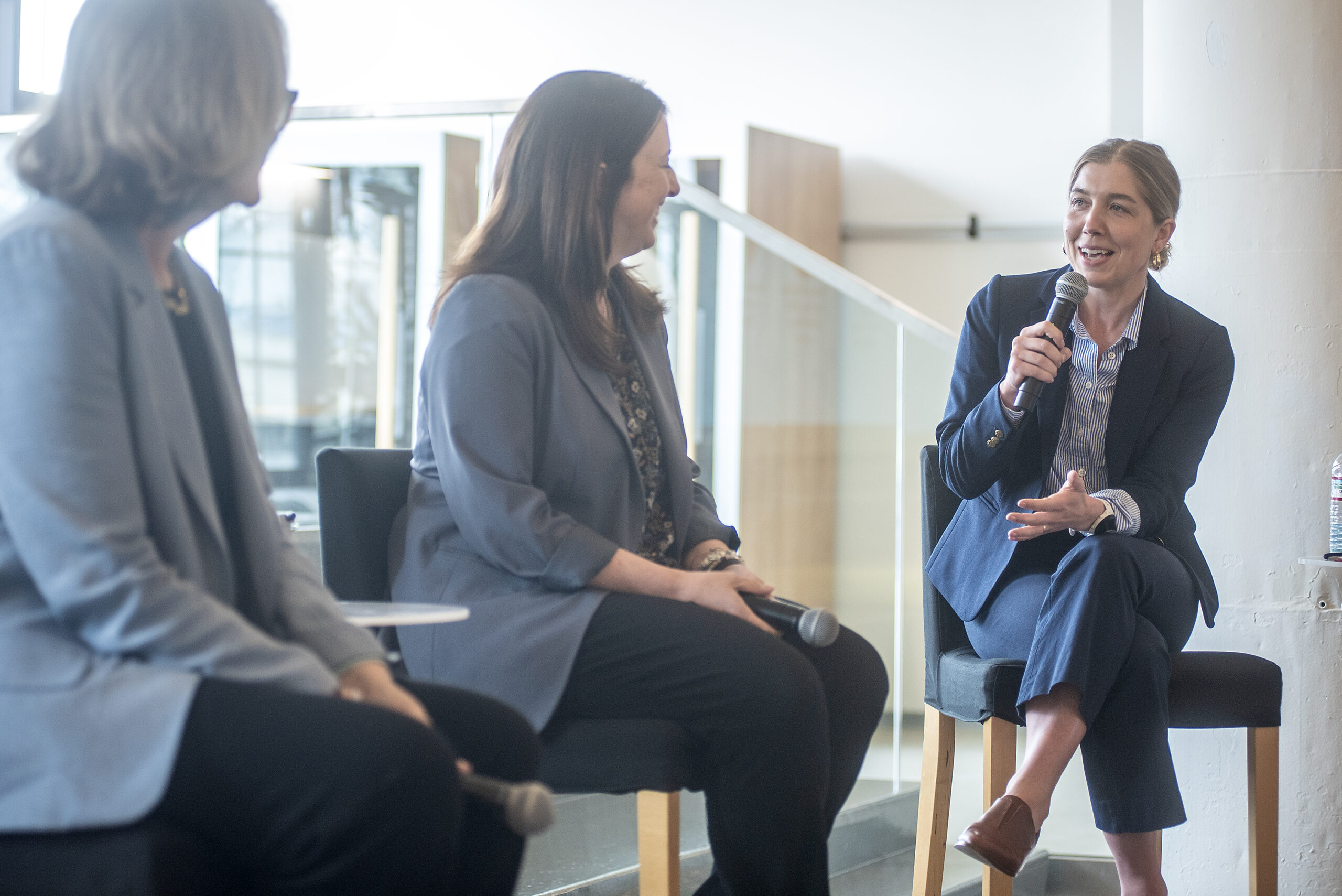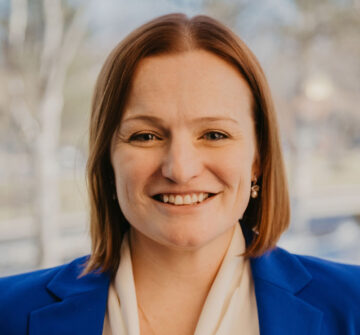Awards Announced During Women’s Health Convening Organized Ahead of Start of BIO International Convention in Boston
BOSTON — Today, the Healey-Driscoll Administration and the Massachusetts Life Sciences Center (MLSC) announced $3.7 million in funding to support 16 projects driving Women’s Health innovation. Interim Economic Development Secretary Ashley Stolba announced the funding during a Women’s Health-focused convening held ahead of the BIO International Convention at EPAM Continuum, a leading digital transformation services and product engineering company. The event featured remarks and panels highlighting innovators, researchers, and policymakers engaged in advocating for translational efforts in Women’s Health and healthcare.

“I am so proud to spotlight Women’s Health as we kickoff an exciting week for life sciences in Massachusetts with the start of the BIO International Convention,” said Interim Economic Development Secretary Ashley Stolba, who serves as co-chair of the MLSC Board of Directors. “Massachusetts will continue to be the best place to drive innovation and company creation in this critical sector. Together with our partners in industry and academia, we are continuing to set a national standard for investment in Women’s Health.”
“Historic underinvestment in Women’s Health has left a significant gap in health outcomes for women, and enormous opportunities for research and innovation,” said Secretary of Health and Human Services Kate Walsh. “Our administration is making targeted investments and driving public-private partnerships to address health disparities across the board and make sure everyone benefits from our state’s outstanding life sciences leadership, including women in Massachusetts and around the world.”
MLSC launched its Women’s Health Initiative to combat the severe lack of organized capital and incentives around a coordinated Women’s Health approach. Since 2019, the MLSC has deployed more than $20 million across 60 projects in collaboration with 15 companies, fostering advancements in translational research. With continued strategic investment in this area, Massachusetts is poised to become the leader in the Women’s Health space. The current programs offered through the initiative focus on increasing the number of translatable opportunities in Women’s Health at Massachusetts research institutions.

“The MLSC’s 3.0 strategy will position our Commonwealth as a national and global leader in Women’s Health,” said MLSC President and CEO Kirk Taylor, MD. “Congratulations to our awardees who exemplify a shared commitment and world-class innovation helping to turn the tide against the severe lack of organized capital and incentives around a coordinated Women’s Health approach.”
Despite some progress, like increased female participation in clinical trials to a clearer focus on Women’s Health, more work remains. According to WHAM (Women’s Health Access Matters), a nonprofit organization that produces regular reporting and analysis on Women’s Health, 80 percent of autoimmune patients and 66 percent of Alzheimer’s disease patients are women, and women are 50 percent more likely to die within the year following a heart attack than men. The current programs offered through the initiative focus on increasing the number of translatable opportunities in Women’s Health at Massachusetts research institutions.
Women’s Health Initiative Awardees:
Women’s Health Collaboration Program
The Women’s Health Collaboration program supports collaborative projects that aim to improve the discovery, technical innovation, and/or analysis of datasets to answer pressing life science questions around Women’s Health.
Awardee: Filipa Lynce, MD, Dana-Farber Cancer Institute
Award Amount: $750,000
Industry Partner(s): Precede Biosciences
Project Title: Leveraging Epigenetics to Address Resistance to PARP Inhibitors in Breast and Gynecological Cancers
Women’s Health Innovation Grants Program
The Women’s Health Innovation Grants programs focus on projects with translational potential and preliminary supporting data but still require a key set of proof-of-concept experiments prior to attracting a commercial partner or spinning out into a new company.
Awardee: Smita Gopinath, PhD, Harvard T.H. Chan School of Public Health
Award Amount: $299,964
Project Title: Microbial and Immune Correlates of Vaginal Beta-Carbolines
Awardee: Ulrich von Andrian, MD, PhD, Harvard Medical School
Award Amount: $300,000
Project Title: A Non-Invasive Approach to Diagnosis of Endometriosis
Awardee: Clifford Saper, MD, PhD, Yaniv Sela, PhD, and Sydney Aten, PhD, Beth Israel Deaconess Medical Center
Award Amount: $299,999
Project Title: In the Heat of the Cycle: The Missing Piece of Female Reproductive Control
Awardee: Jayender Jagadeesan, PhD, Brigham and Women’s Hospital
Award Amount: $199,498
Project Title: Personalized 3D-Printed Breast Molds for Reconstruction Surgery in Mastectomy Patients Using Mixed Reality Technology
Awardee: Vesela Kovacheva, MD, PhD, Brigham and Women’s Hospital
Award Amount: $147,998
Project Title: Development of a Novel Closed-Loop Infusion System for Vasopressor Administration in Pregnant Patients Presenting for Cesarean Delivery
Awardee: Michael Rogers, PhD, Boston Children’s Hospital
Award Amount: $300,000
Project Title: Anti Capillary Morphogenesis Gene 2 (CMG2) Camelid Antibodies as Diagnostics and Therapeutics for Endometriosis
Awardee: Zsuzsanna K. Zsengeller, MD, PhD, Beth Israel Deaconess Medical Center, Department of Medicine
Award Amount: $300,000
Project Title: Novel Organofluorine Hydrazones Targeting Oxidative Stress for Preeclampsia Treatment
Awardee: Heidi Leftwich, DO, UMass Chan Medical School
Award Amount: $300,000
Project Title: Increasing Health Equity with Point of Care Diagnosis for Cervical, and Vulvar Cancer
Awardee: Laurie Glimcher, MD, Dana-Farber Cancer Institute
Award Amount: $300,000
Project Title: A Novel Treatment for Postmenopausal Osteoporosis in Women
Awardee: Juan Gnecco, PhD, Tufts University
Award Amount: $300,000
Project Title: NeurOsis: An Innervated Physiomimetic Platform for Modelling Neuroinflammation in Endometriosis
First Look Awards Program
The First Look Awards program, a collaboration between the MLSC and the Mary Horrigan Connors Center for Women’s Health and Gender Biology at Brigham and Women’s Hospital, supports exploratory projects to begin developing translatable solutions for Women’s Health and furthering our understanding of gender biology.
Awardee: Joyce Wong, PhD, Boston University
Award Amount: $50,000
Project Title: Identifying Mediators of Tubal Infertility from Upper Reproductive Tract Infections in a Fallopian Tube-On-A-Chip
Awardee: Ursula Kaiser, MD, Brigham and Women’s Hospital and Harvard Medical School
Award Amount: $50,000
Project Title: Targeting the Role of OSR1 in Embryo Implantation: A Promising Approach to Improve Management of Recurrent Implantation Failure (RIF)
Awardee: Juan Gnecco, PhD, Tufts University
Award Amount: $50,000
Project Title: Development of CRISPR/Cas9-Engineered Organoid Model to Reveal Genetic Origins of Endometriosis
Awardee: Therese Rajasekera, PhD, Brigham and Women’s Hospital
Award Amount: $50,000
Project Title: Uncovering the Crosstalk Between the Gut and Vaginal Microbiota Ecosystems and Its Role in Brain Health and Disease
Awardee: Jie Shen, PhD, Northeastern University
Award Amount: $49,999
Project Title: Accelerating Women’s Health Solutions: A Bioengineered Vaginal Tissue Model for Modern Drug Development and Testing
About the MLSC
The Massachusetts Life Sciences Center (MLSC) is an economic development investment agency dedicated to supporting the growth and development of the life sciences in Massachusetts, home to the most verdant and productive life sciences ecosystem in the world. Through public-private funding initiatives, the MLSC supports innovation, research and development, commercialization, and manufacturing activities in the fields of biopharma, medical device, diagnostics and digital health. Since its creation in 2007, the MLSC has strategically deployed more than $1 billion in Massachusetts, through a combination of grants, loans, capital infrastructure investments, tax incentives and workforce programs. These investments have created thousands of jobs and propelled the development of new therapies, devices and scientific advancements that are improving patient health and well-being in Massachusetts and beyond.



